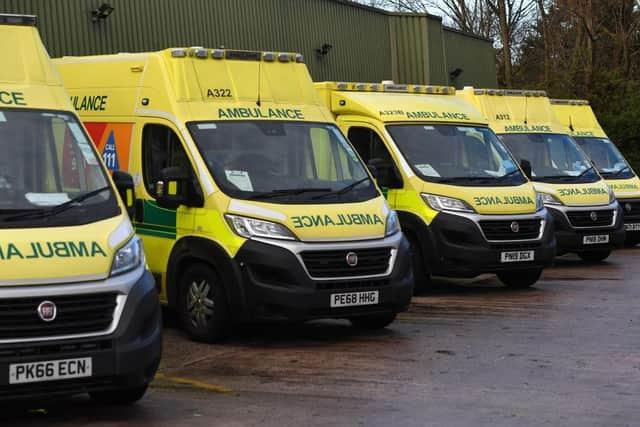February strikes: What’s happening this week in Sussex?
and live on Freeview channel 276
In the South East Coast Ambulance Service (SECAmb) region, the GMB Union balloted its members for industrial action last year and met the legal threshold to take action. Strike days take place today (Monday, February 20), March 6 and March 20.
The GMB Union said more than 11,000 ambulance workers will walk out in England and Wales today.
Advertisement
Hide AdAdvertisement
Hide AdParamedics, emergency care assistants, call handlers and other staff will stage more than 100 pickets across eight different trusts.


Workers across the ambulance service voted to strike over the Government’s imposed real-terms wage cut and are furious over the Government’s refusal to talk to them about pay.
Rachel Harrison, GMB National Secretary, said: "Ambulance workers across England and Wales will strike today – entirely because this Government is tin eared.
“It’s been over a month since the Government engaged in any meaningful dialogue. They are missing in action and refuse to talk pay.
Advertisement
Hide AdAdvertisement
Hide Ad“There’s a recruitment crisis in the NHS. Solving the issue of pay is vital if we’re going to stem the tide of dedicated healthcare workers leaving the profession.
“The public back ambulance workers. The Government must listen to them and talk pay now.”
The NHS in the South East is asking patients to seek emergency care if they need to during strike days and take simple steps to help ensure care is available to patients who need it most. General practice, community pharmacies, and dentistry are not impacted by strike action and the public should continue to access these services as needed on strike days.
Ambulance services will prioritise the most clinically urgent cases and on strike days, if it is not life-threatening, people may have to wait longer than usual for an ambulance. Where safe and appropriate, some may be asked to make their own way to hospital – although it is important that they get medical advice from 111 or 999 before doing so.
Advertisement
Hide AdAdvertisement
Hide AdThe NHS will contact anyone whose appointment has to be rescheduled due to strike action. If the NHS has not been in contact, it is important that people continue to attend appointments as planned.
Dr Vaughan Lewis, NHS England’s South East medical director, said: “We are incredibly grateful to the public for their care in how they use the health service during strike days. Disruption is inevitable, however it is vital that people do not put off seeking care and dial 999 in a life-threatening emergency and come forward for treatment using 111 online for non-life-threatening care, as well as using local pharmacies or general practice.”
Dr Rachel Oaten, chief medical officer for SECAmb, said: “We are asking for the public’s continued support in using our services appropriately. We need the public to remember that 999 should only ever be dialled in an emergency – that’s the case every day but it’s even more vital that our services are used wisely during any period of industrial action.
“Anyone who calls 999 who isn’t facing a life-threatening emergency is likely to wait longer for a response or be directed to alternative care.”
Advertisement
Hide AdAdvertisement
Hide AdMark Ainsworth, director of operations at SECAmb, said: “Industrial action on Monday within SCAS will be by the GMB union, of which we have 230 members out of around 4,500 staff across all our services. As a result, the impact will mainly be our non-emergency patient transport service in Surrey and Sussex, but there may be some action in our 999 and 111 services. We have been working closely with our local and regional GMB representatives to make sure essential services are maintained and impact on patients is minimised.”